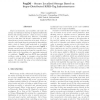Free Online Productivity Tools
i2Speak
i2Symbol
i2OCR
iTex2Img
iWeb2Print
iWeb2Shot
i2Type
iPdf2Split
iPdf2Merge
i2Bopomofo
i2Arabic
i2Style
i2Image
i2PDF
iLatex2Rtf
Sci2ools
MDM
2007
Springer
2007
Springer
FragDB - Secure Localized Storage Based on Super-Distributed RFID-Tag Infrastructures
Smart environments and wearables will make the storage and subsequent sharing of digitized multimedia diaries and meeting protocols – whom we meet, or what we say or do – cheap and easy. However, controlling access to this data will become cumbersome if traditional forms of access control are to be used: Overly restrictive rules might deny the potential of data sharing, while a lack of control could easily lead to Orwellian surveillance scenarios. This paper presents FragDB, a storage concept based on localized access control, where data storage and retrieval are bound to a specific place, rather than a the knowledge of a particular password or certificate. FragDB uses tiny RFID tags embedded in floors, walls or desks, to compute a local key that is used to encrypt and decrypt data in a global storage system. We describe the setup of an initial prototype and analyze its complexity.
| Added | 08 Jun 2010 |
| Updated | 08 Jun 2010 |
| Type | Conference |
| Year | 2007 |
| Where | MDM |
| Authors | Marc Langheinrich |
Comments (0)

